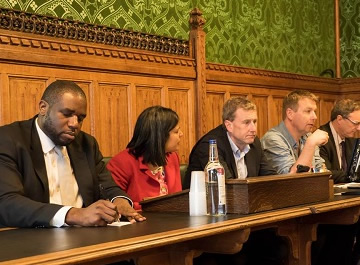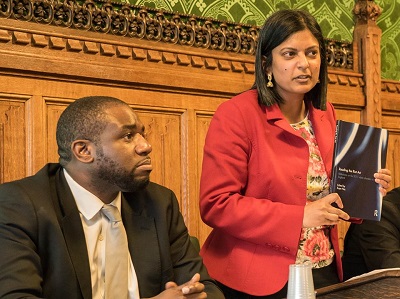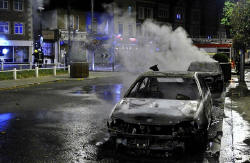Riots and Regeneration in Ealing
What happened in 2011 and could it happen again?
|

MPs David Lammy and Rupa Huq, Pat Hayes Director of Regeneration Ealing Council) Danny Dorling (Oxford University) Keith Fraser, Ealing Council ( pic credit Alexander Babuta )
Ealing residents packed into a Westminster committee room this week, to listen to and question a panel of experts discussing the riots of 2011, with specific reference to Ealing.

Labour MPs, David Lammy and Rupa Huq ( pic credit Alexander Babuta )
The Ealing and Acton MP, Rupa Huq chaired the meeting which launched her new academic book, 'Reading The Riot Act'. The 2011 riots were by no means unprecedented, she said, highlighting previous disturbances including those in 1981, 1991 and 2001.
On the panel were Tottenham MP, David Lammy, Ealing's Director of Regeneration, Pat Hayes, Keith Fraser who wrote the council report following the Ealing riots and Professor of Geography at Oxford University, Danny Dorling.
Mr Lammy said there was always a spark which instigated the start of a riot and, in his view, it was usually the perceived aggression by the police or armed forces. In 2011 in Tottenham an unpopular stop and search policy and the shooting dead of Mark Duggan by police was the catalyst.
Why it spread to other areas, including Ealing was not quite so straightforward, but Ealing's transport network combined with the use of social media as a communication tool meant over half those involved came from outside the borough.
Mr Lammy challenged the notion that it was only young people involved and argued against the term some used at the time describing rioters as 'feral' classes. Rather he said it was more appropriate to use the term 'workless' classes.
The panel discussed the idea that those involved in the looting and destruction generally had nothing to lose - they had no stake in the society in which they lived.
With a housing crisis in London, a lack of affordable homes they highlighted a growth of inequality. Many have done well on the property market but many more generations won't ever be able to afford to live in the area they grew up.
Ealing's Regeneration Director, Pat Hayes, spoke of the huge challenges facing councils and the need to provide affordable housing. ' If people can't afford to live in London, London will decline' he said.
Ealing had to look ahead and provide a modern future centre, a high street which was more of a 'destination centre' providing both housing and leisure activities, not just shops.
Mr Hayes, himself a keen cyclist, said there were also environmental challenges to deal with in Ealing too. He wants to encourage greener ways of getting around; more walking and cycling and less car use. He said research has shown people spend more time and therefore more money in the town centre if they cycle or walk and cited Copenhagen as a model.
A variety of questions from the audience included concerns about building more housing without providing the adequate infrastructure, the density of such new builds and key concern - how to give people a stake in the society they live in.
So, could riots such as in 2011 happen again?
Danny Dorling argued that there has been a long tradition of riots and was uncategorical in his assertion ' there will be more, there always are.'
David Lammy said we all had to accept some uncomfortable truths, it's not just young people who are disaffected but there is something happening in society.
He said although we can't ever really predict what will happen '' These are turbulent times we live in and they're not over yet.'
13th April 2016
